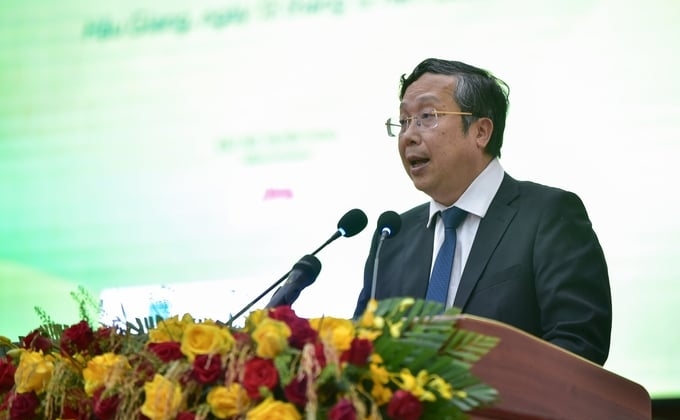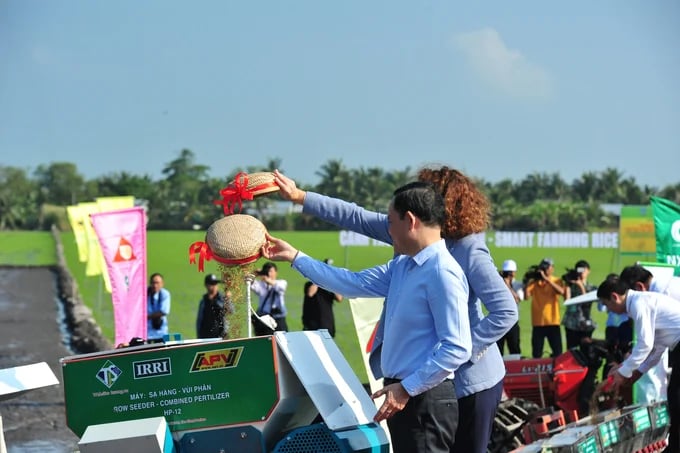November 15, 2025 | 02:02 GMT +7
November 15, 2025 | 02:02 GMT +7
Hotline: 0913.378.918
November 15, 2025 | 02:02 GMT +7
Hotline: 0913.378.918

Deputy Minister of Agriculture and Rural Development Hoang Trung.
At the International Workshop on Science, Technology and Innovation in Rice, Deputy Minister of Agriculture and Rural Development Hoang Trung said that the impact of the El Nino phenomenon on agricultural production and supply disruptions will continue to put pressure on the global food system in the near future.
"This situation not only puts the lives of many people in a precarious situation but also hinders the path towards the United Nations' sustainable development goals," Deputy Minister Hoang Trung said.
According to the leader of the Ministry of Agriculture and Rural Development, besides extreme weather, disrupted transportation activities also put pressure on the global food system is facing many challenges when it has to ensure food and nutritional needs while also facing pressure from population growth, loss of resources, climate change and environmental pollution.
In particular, responding to and minimizing the impact of climate change is considered the biggest challenge for the rice industry and the global food system. FAO statistics show that rice is the main food source for more than half of the world's population. Ensuring sustainable and affordable rice supply and distribution is key to maintaining socio-political stability in many countries.
At the same time, improving the rice industry is the optimal solution to increase the income and livelihood of hundreds of millions of small-scale rice farmers in Vietnam and many rice-growing countries worldwide. A future without hunger requires collective efforts and cooperation from all countries.
In Vietnam, rice is a traditional and important production industry, creating livelihoods for millions of farmers nationwide.
In recent years, Vietnam has achieved many great achievements in rice production, making an important contribution to ensuring national and world food security. Currently, it maintains its position as one of the leading exporting countries. leading rice in the world with constantly increasing export turnover.
From the beginning of the year until now, the country has exported 7.37 million tons of rice, bringing in US$ 4.15 billion, and it is expected that in 2023, rice exports will reach 8 million tons and turnover will reach US$ 4.5 - 4.8 billion.

Project launching event of 1 million hectares of high-quality rice in Hau Giang. Photo: Le Hoang Vu.
Deputy Minister Hoang Trung acknowledged that such achievements are due to the significant contribution of science, technology and innovation.
Specifically, regarding rice varieties, Vietnamese seeders have mastered the technology and created a very diverse set of rice varieties suitable for each region and each specific goal, such as a set of high-quality rice varieties serving export, alum- and salt-resistant rice varieties adapted to climate change, high-yield rice varieties for processing...
To date, rice varieties selected by scientists have been transferred and applied nationwide with an area of about 6.2 million hectares, accounting for nearly 80% of the country's rice area. The two rice varieties OM 6976 and OM5451, selected by Associate Professor Dr. Tran Thi Cuc Hoa and his colleagues, are among eight projects honored in the "Glory of Vietnam - Imprints of projects".
These are high-yield and high-quality varieties for export. Particularly, the OM5451 rice variety was once planted on an area of nearly 1,000,000 hectares in the Mekong Delta; ST rice variety by agricultural engineer Ho Quang Cua won the World's Best Rice award in 2023; Many new rice varieties have been researched, selected, created and transferred into production by scientists and businesses, bringing high productivity and added value, increasing income for farmers.
Regarding the intensive farming process, advanced techniques and integrated rice cultivation have been developed synchronously and are increasingly being perfected.
The process of using balanced fertilizers, from dosage and ratio to fertilizing at the right time and in the right way, with the right type and suitable form of fertilizer for each specific region, has been applied, increasing economic efficiency for farmers; Cultivation techniques of reducing the amount of sown seeds, applying fertilizer appropriately, applying "3 reductions, 3 increases", "1 right, 5 reductions", using antagonistic fungi to manage pests... also contribute significantly to the Today's results of the rice industry.
In addition, many studies on soil, pests, nutrition, and input materials... have been accumulated and synthesized into farming processes and transferred for effective application in rice production.
Regarding harvesting and post-harvest technology, Vietnam has researched and mastered harvesting technologies, applying synchronous mechanization in all stages to reduce losses during harvest and post-harvest, Applying a modern drying system and preserving rice in silos with a controlled environment and long-term preservation system but still maintaining good rice quality to meet export requirements.
In addition, deep-processed products, nutrition, cosmetics from rice, and products using rice by-products that bring added value are also being developed, contributing to increasing the efficiency of rice production and reducing greenhouse gas emissions and protecting the environment.

Xa No Canal, Hau Giang province, is the first major waterway project in the South, helping to transport rice, with a history of 120 years. Photo: Tung Dinh.
"In recent years, with the efforts of the community of scientists, businesses, farmers... the application of science and technology and innovation in the value chain of Vietnam's rice industry Nam has contributed to making history in the rice industry with results like today," commented the Deputy Minister.
For science, technology and innovation to continue to be the driving force for developing a rice industry with high added value, sustainability, and low emissions, the Deputy Minister called for continued investment in research and development and Applying new, advanced, and environmentally friendly technologies in all stages of the rice production value chain is an inevitable and important solution.
He considered the conference on the afternoon of December 13 as connecting countries that need help with countries that can support; Organizations willing to join hands and accompany; Scientists, businesses and rice farmers provide policy advice, technical support, human resource training, technology transfer, and financial investment.
Let's join hands to build a green, clean, responsible and sustainable rice value chain ecosystem based on new knowledge.
Translated by Tuan Huy

(VAN) The Food Waste Recycling Handbook, launched in Ho Chi Minh City helps the community reduce waste, protect the environment, and promote a green lifestyle.

(VAN) The activities under the model help reduce disaster risks while encouraging children’s participation in climate-change adaptation and environmental protection.

(VAN) ALiSEA Viet Nam has a diverse network of experienced members in agroecology development, including 69 research organizations, international institutions, and private enterprises.

(VAN) Through its new-generation cooperatives, An Giang is shaping modern agricultural value chains, promoting a green economy, and enhancing both farmers’ income and their social standing.

(VAN) An Giang has fostered a generation of professional farmers with strong business acumen, working together to build a modern and sustainable agriculture in the era of green production.

(VAN) Farmers in the Mekong Delta are advancing with a new production mindset, applying technology, protecting the environment, and creating sustainable agricultural value.

(VAN) From a small-scale industry, livestock production and animal health has become a concentrated, professional, modern technical economic sector.